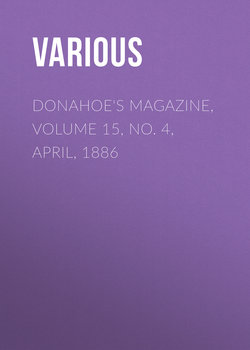Donahoe's Magazine, Volume 15, No. 4, April, 1886

Реклама. ООО «ЛитРес», ИНН: 7719571260.
Оглавление
Various. Donahoe's Magazine, Volume 15, No. 4, April, 1886
The Welcome of the Divine Guest
John Scotus Erigena
Frau Hütt: A Legend of Tyrol
Echoes from the Pines
Musings from Foreign Poets
Erin on Columbia's Shore
The Ursuline Convent of Tenos
Southern Sketches
The Church and Modern Progress
Give Charity While You Live
Emmet's Rebellion
The Annunciation: – March 25th
Much-a-Wanted
Mixed Marriages
Farewell, My Home
The "Ten-Commandment" Theory
Bay State Faugh-a-Ballaghs
Drunkenness in Old Times
The Paschal Candle
Our New Cardinal
The Irish as Conspirators
Orders of Knighthood
Low-Necked Dresses
Columbus and Ireland
Miss Mulholland's Poems: "Vagrant Verses."
Seeing the Old Year Out: A True Story
Juvenile Department
Lenten Pastorals
Notes on Current Topics
Personal
Notices of Recent Publications
Obituary
Отрывок из книги
During the ninth century there lived few more remarkable men in Western Europe than John Scotus Erigena, the celebrated Irish theologian, philosopher and poet. Little beyond mere conjecture is known of his birth and early education. Indeed, the first well-authenticated facts in connection with his life is that in the year 851 he held the offices of rector and professor of dialectics in the famous Royal School of Paris, and that he occupied at the same time apartments in the palace of Charles the Bald, son of Louis le Débonnaire, and grandson of the Emperor Charlemagne. It may, however, be interesting to see what historical critics have to say of his birth and early antecedents.
Almost all writers of weight are agreed that John Scotus Erigena was an Irishman. In fact, there is hardly any room for doubt on the subject. If all other evidences of the fact were absent his very name furnishes proof enough that John was a son of the Emerald Isle. John Scotus Erigena simply means John the Irish Scot – Erigena being a corruption of a Greek word, the translation of which is "of the sacred isle," and every school boy knows that Ireland was known at that time throughout the nations of the earth as the "insula sanctorum et doctorum," the "island of saints and sages."
.....
How long he remained in Paris after his dismissal from the Royal School cannot be determined, nor do we know how he ended his days. Some assert that "he was murdered by a band of infuriated students at Oxford or Malmesbury," but this is by no means certain.
Jan. 18th, 1885.
.....